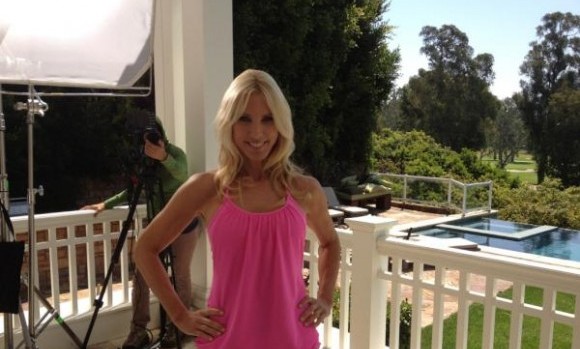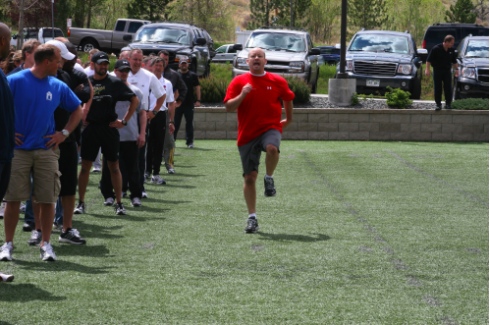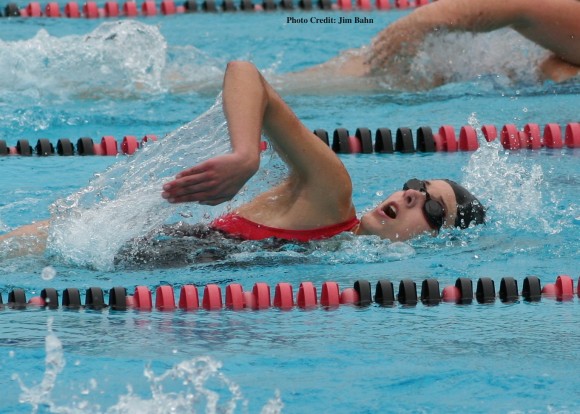 Since 1999, Coach Robert Dos Remedios has been the Director of Speed, Strength & Conditioning at College of the Canyons in Santa Clarita, CA, where he trains athletes in every sport across the board. “Coach Dos” has been a certified Strength and Conditioning Specialist with the National Strength and Conditioning Association (NSCA) since 1990, was voted the Collegiate Strength and Conditioning Professional of the Year in 2006, and received the honorable MSCC (Master Strength and Conditioning Coach) designation by the Collegiate Strength and Conditioning Coaches Association (CSCCa) in May of 2012, making him one of very few coaches of this caliber.
Since 1999, Coach Robert Dos Remedios has been the Director of Speed, Strength & Conditioning at College of the Canyons in Santa Clarita, CA, where he trains athletes in every sport across the board. “Coach Dos” has been a certified Strength and Conditioning Specialist with the National Strength and Conditioning Association (NSCA) since 1990, was voted the Collegiate Strength and Conditioning Professional of the Year in 2006, and received the honorable MSCC (Master Strength and Conditioning Coach) designation by the Collegiate Strength and Conditioning Coaches Association (CSCCa) in May of 2012, making him one of very few coaches of this caliber.
After playing at University of California – Berkeley, Coach Dos earned his Masters Degree in Kinesiology with an emphasis in Biomechanics from Cal State – Northridge. From there, in addition to his coaching career, he became an international speaker on a variety of strength and conditioning topics such as program design, cardio-strength training, Olympic weightlifting applications, sport-speed development, explosive training, cardio-strength metabolic training, and CHAOS™ speed training. He is also the author of two best-sellers.
ATLX sat down with Coach Dos in the weight room at College of the Canyons to learn what makes him one of the most well-known and respected coaches in strength and conditioning.
ATLX: Coach Dos, you were recently designated as a Master Strength and Conditioning Coach. What can you tell me about that achievement?
Coach Dos: That was a great honor from the CSCCa, a group started by the legends in the field, by the pioneers. It’s based on your experience and on how many years you have been a full-time coach and the things that you’ve done. It’s a really cool thing to have for my college because we’re the only community college to have somebody in that position.
ATLX: What can you tell me about some of the elite level athletes that you have trained or worked with?
Coach Dos: The greatest thing about this level is that we don’t get too many elite athletes. We have kids who are developing and then going on and becoming professionals, or at least playing at the Division-1 level. We’ve had about eight kids get to the NFL level. None of them – which is our proudest aspect of this – were recruited out of high school. They were these athletic balls of clay, and we were able to get them on the right path to get them their individual scholarships and help them succeed.
It doesn’t happen often, but we do get kids who come in and even their high school coaches say, “Oh, no, they won’t play for you. They won’t be able to get a scholarship, they’re not very good.” And then they develop and they start getting individual scholarships. We really pride ourselves here, especially with football, in getting a lot of scholarships. Obviously, the kids have to take care of their academics, but physically, we feel like we’re preparing them as well as, if not better than, anyone in the country.
ATLX: And do you think that training them for strength and conditioning is a major factor in molding their success from someone who didn’t show the potential initially?
Coach Dos: Absolutely. We try to build a culture here, and it’s embedded in hard work and building better athletes through that hard work, and then buying into teamwork.
The kids who come through here really buy in and believe and have success, and they spread the word. It’s almost contagious when our athletes say, “Hey, at our place we did this and we do that.” So we feel like, even though we’re this small community college here in Southern California, we have our hands in a lot of things. I’ve consulted with a lot of NFL teams, helping with their speed work or different things we do in the weight room such as TRX and other things like that. For us, that’s a cool thing because we can sit back and see all these things spread.
I definitely think from the perspective of the kids coming in, the physical development is a huge, huge part.
ATLX: Speaking of motivating your athletes, your motto is “Do work.” Where does that come from?
Coach Dos: My training philosophy has always been based on building work capacity. It’s really simple and it seems like a no brainer, but people are always a bit confused. They say, “Oh, we use this tool” or “We use this gimmick” and “Our philosophy is this and that.” But here, ours is just work capacity, and that just leads to one thing – overload. So, we really try to push the envelope every day.
ATLX: Okay, let’s talk about the books that you’ve written, Men’s Health Power Training: Build Stronger Muscles Through Performance-based Conditioning (Rodale, 2007); and Cardio Strength Training; Torch Fat, Build Muscle and Get Stronger (Rodale 2009).
Coach Dos: The first one was a great opportunity for me. I started by doing some writing for Men’s Health magazine. I was then approached by someone at Rodale Books, which is associated with Men’s Health, and he asked if I would think about writing a book. I laid out some material, gave it to them, and they said, “This stuff is really good.”
A few years ago nobody in the general population was looking at the training angles. But it’s a cool thing now to see, for example, how T.O. [Terrell Owens] looks like that. How does he train? They [Rodale] were starting to get away from the whole bodybuilding thing in order to focus more on functional strength. That book really blew-up, and it actually still sells well right now.
The second book was a spin-off of the first and really is geared more toward those in the general population who are looking at fitness and fat-loss. Both books opened up a lot of avenues for us to get exposure here at the College of the Canyons. And then, for me to get out there to talk and present around the world on the things that we do here, it was eye opening for a lot of people.
ATLX: Let’s move into the strength training that you do. Do you have any principles that you base your training on?
Coach Dos: Everything goes into our general philosophy. It’s called power to the fourth, which is basically training explosively whenever we can, free weights primarily, multiple-joints, and training on your feet. We want to make sure that we’re being sound and functional. We do a lot of Olympic lifts, but then we also do a lot of things like suspension training, kettle bells, sandbags, and things like that, so we’re constantly evolving. Some of the things we’re using now, we weren’t using a year or two ago.
Next year we might be doing something else. Something new might come along that fits in better or might be better for whatever purpose we have. We have a lot of toys and we use them all on a pretty regular basis.
ATLX: Obviously, every athlete is different, so what are some of the obstacles that you’ve faced in training different athletes and what are some of the obstacles that the athletes face themselves?
Coach Dos: I hate to use a blanket statement, but it’s a little different now in 2012 than it was even in 2002. The kids are coming in with a bit of a different attitude. And it’s starting at lower levels, whether it’s their high school or JV team, or whatever they played outside of school. The expectations have seemed to drop and it’s tough because I’ve always set the bar very high when you walk through the door. So it’s been a little tougher getting them to meet my expectations for them. Once they can get over that mental hump, it’s not a physical deal, that’s the biggest thing.
For me, it’s about being able to have different teams coming and going, from football to women’s soccer, and not just looking at men and women, but different types of men and women. My volleyball girls are completely different in terms of how they act, how they attack the weights versus my basketball women, versus my basketball men or my soccer men. So I always tell people, you can know all this stuff in the book, and we can know training and programming, but there really is an art to the coaching aspect because if you can’t implement and get people to excel, then it’s just a program on paper. For us, the biggest thing is to be able to address the teams individually.
ATLX: You mentioned how athletics are extremely psychological. Mental. How do you help your help your athletes with this aspect? I know they can get into their own head too much, and it can mess up their game or their training. How do you address that issue?
Coach Dos: For us, we end up with mental toughness just because we train so hard. Just this past year, I got to listen to a sports psychologist, and some of the things I heard sparked an interest in bringing somebody in to work with some of our groups.
I heard somebody say that sports psychology is almost a taboo word that sometimes implies that something is wrong. I like the whole aspect of mental coaching – like focusing, setting goals, things like that.
ATLX: How often are you training purely for strength and conditioning?
Coach Dos: It depends on the time of year, but football is our biggest group, and we generally go four times a week, year round. During the season, we’ll go three times and then we have a day off on Thursday, where it’s an optional day. We get about 60-70 percent of the guys coming in to do something on that Thursday. We’ll guide them on that off day, so they don’t come in here and do curls or something (haha).
But most of our teams train two to three times a week, depending on their practice schedule and what their coaches want. We have been able to be effective on our two-day full-body sessions. In the off-season, we get them to do three, and then on the third day we do more of a conditioning session, getting them ready because they run so much during the summer and fall.
ATLX: So does every sport train more often for strength and conditioning during the off-season?
Coach Dos: Generally, yes. Sometimes it’s about the same as far as the hours allotted, but I’ll try to squeeze in a few more minutes. Even just another 15 minutes makes it a significantly tougher session. I optimally like to get a session done in about 45 minutes. It took us about 55 minutes today, but we have a lot of new girls, which is a learning process. If you were to come back in three or four weeks, the tempo would be different. We wouldn’t have the same stop, teach, learning going on like we have right now.
ATLX: How much variety should there be in strength and conditioning training?
Coach Dos: We use a ton of different implements, and we do a ton of different exercises, but they all fall within the movement pattern. We have a lot of variety, probably more than most. Because of our experience, we can throw more at them. Some people don’t want to do a lot of variety because it takes time to teach, but that’s our job. I don’t have a problem doing twelve different types of Olympic lift variations where somebody else might just do power cleans or dumbbell snatches. For us, it’s a matter of how much we are able to teach, how much we feel comfortable with. I think the more the better. We’re still working on that explosive pattern, maybe from a different implement area, a single limb or something, but we’re changing it up constantly.
ATLX: Let’s focus on everyday athletes compared to the elite athletes that you train. How does that differ? And how can everyday athletes work towards a higher level of training?
Coach Dos: That really goes to my second book, Cardio Strength Training; Torch Fat, Build Muscle and Get Stronger, where we killed two birds with one stone – strength training and the metabolic or traditional cardio training. That basically catches about 90 percent of the general population, including weekend warriors – people who just want to stay fit, play with their kids, run the beach, play volleyball or whatever they do. The only time when you need more of a structured periodization program and working on a strength phase is when people are training for something very specific; when they are competing for something.
For the most part, I think, most people are not meeting their goals for a variety of reasons. I think one of the big ones is that people generally don’t understand that with an overload principle, we have to really push. Everybody wants a quick fix – the six-minute abs and all that stuff. You have to put in the work if you want to reach your goals, whether it’s losing weight or getting a bigger bench press or building muscles or whatever it is.
The biggest thing is just understanding and embracing “overload.” I always talk about personal confrontation. I tell our athletes if we’re 20 minutes into a conditioning session or an hour into our weights, “If that little voice isn’t in your head, if you’re not hearing that voice, you’re not talking to it, dealing with it, you’re probably not training hard enough at this point.”
ATLX: How important is recovery in terms of improvement and success?
Coach Dos: Very important. That’s something we drill into our athletes. When you’re 19, 20 years old, you think you’re invincible. We have kids in training who stay up late at night and then expect to come back and be effective in the morning. We emphasize getting enough sleep and they try to get their naps in when they can. Eat right, rest and recover.
ATLX: You have said that guys shouldn’t train to get big and they shouldn’t train to look big. They should train to be strong. Where does that come from, and why is that important?
Coach Dos: Our whole purpose is to train in a more functional manner. We won’t ever do any single joint exercises like tricep kickbacks or bicep curls or anything like that, but we have guys who are still doing heavy pulling exercises like chin-ups and rows and things like that. So they are still going to address those movement patterns in those muscles, and that’s what I talk about in the first book – – training for function rather than just for the aesthetics of it. The aesthetics will come as long as the conditioning is there and the eating is right.
ATLX: If you could give advice to an athlete looking to step his game up to get to that next level, what would it be?
Coach Dos: I think it’s going back to that first thing we just talked about, pushing the envelope, being smart about it and making sure you have a sound program. If you don’t know what to do, get with somebody, go visit people, train.
I’ve been doing this for over 20 years, and I’m still visiting and talking to coaches. Every time I go anywhere around the world, I try to get to the Olympic training center in that country, or that weight room in North Carolina, for example. I just try to find one little thing. It could be something like what we have written on our weight room wall, You Got Better, right above the door. I got that up at Holy Cross, and I thought that’s really cool. When the kids exit it’s going to ram it into their heads, this is what we do in here, we get better.
It’s about what you’re doing when nobody is watching. That’s the biggest thing, if athletes can wrap their head around that. People who want to train to get better, want to lose weight, if they can just wrap their head around that, it’s the biggest step. That’s the biggest hump I think in most people’s lives essentially.
ATLX: If you could give an athlete some of your rules to train by, what would they be?
Coach Dos: Well, for us it just goes back to everything we do. We want to make sure that everything we do in here is going to transfer as much as possible to what they’re doing because that’s our purpose. I’m doing them a disservice if I don’t do my best to get them ready, to get them faster, stronger, better.
For us, it’s about trying to build a better athlete – that would be our philosophy and then, on top of that, you’ve got the whole culture that we’re trying to build. We’re just going to work, and I want our athletes to be coaches in here too. That’s why today I wanted to make sure that some of the veteran girls were helping the new girls. Or sometimes they might need to get on them a little bit. That’s just one of those things that we try to build here with the culture.
ATLX: You focus a lot on increasing speed. If someone wanted to increase their speed, what are certain areas they should focus on?
Coach Dos: The first thing I always tell people is they have to get stronger. I think there’s that myth that you can just go out and train like a track athlete and you’re going to get strong. Well, very successful track athletes are very strong, and they usually have a good weight room regimen. So, for us, the first thing I always talk about is what are you doing with weights? A lot of times they’re not doing anything, so that’s the first thing that we’ll address.
We don’t really train a lot of linear speed, like straight ahead speed, because all of our sports demands are going to be more chaotic. So, for us, we just do more sport-specific speed work – decelerating very quickly, going into acceleration, changing directions, etc.
Our sprinters have their track coaches who are specialists with that, so that’s what they do. But I don’t want our baseball players, our football players or our basketball players necessarily training with track coaches in the off-season because the demands of their sports are going to be more chaotic.
ATLX: Are there any common misconceptions about training that might cause someone to make a mistake that’s going to hinder their ability to improve?
Coach Dos: I think there are still some sports culture things out there, like, “training with weights is actually going to make me slower,” for example. With all we know now, from when I started doing it back in 1989, it’s changed so much in terms of going more functional, going to more balance, addressing muscle imbalances, making sure we’re training in every movement pattern, making sure we’re training sports specifically. I think, in general, we’re just much better at what we do now. The misconceptions come from some of the stereotypes from the old weight room muscle man stuff. I just don’t know how prevalent that is anymore.
Nowadays I think there’s a push with the Internet where there are people out there who want to be different for the sake of being different. We know what works. I have some different tools, but the movement patterns are intact, and the philosophy is embedded in that bedrock of work capacity. We may have different tools, but it doesn’t change the philosophy. I think now you’ve got people changing philosophy to sell a certain program or sell a certain implement. I think it all comes back to the center automatically because common sense prevails.
ATLX: Thank you so much, Coach Dos. Great stuff here.
See:
ATLX Expert: Robert Dos Remedios
ATLX Partner: Collegiate Strength and Conditioning Coaches Association
College of the Canyons Athletics
www.CoachDos.com
Want more ATLX exclusives? Follow us on Twitter and like us on Facebook.
 ATLX The only sports entertainment television and digital media network fully devoted to everyday athletes, athletic lifestyle and athletic culture.
ATLX The only sports entertainment television and digital media network fully devoted to everyday athletes, athletic lifestyle and athletic culture.




